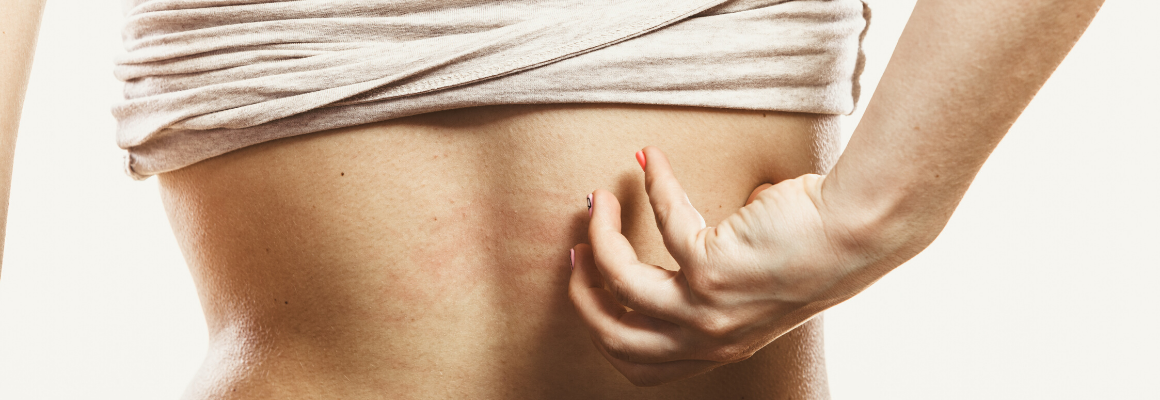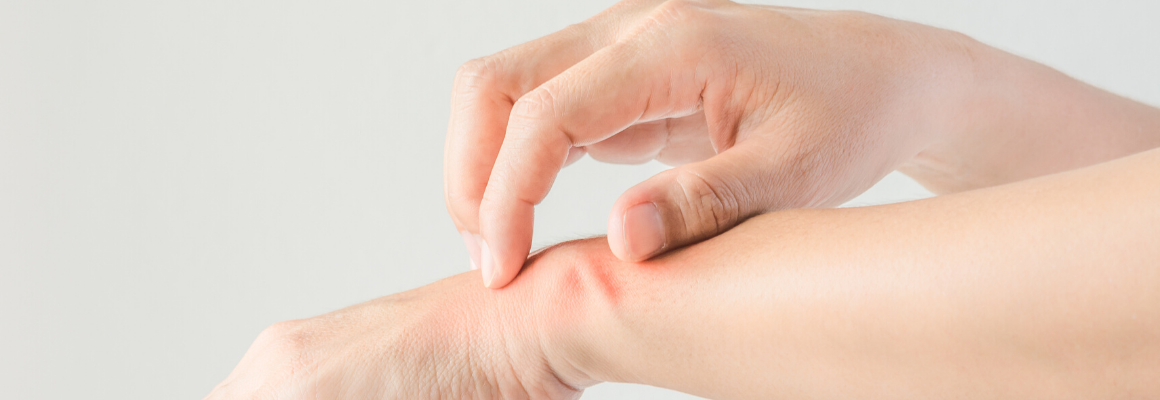Eczema is an inflammatory skin condition that involves dry, red, and flaky patches of skin. Sometimes, it even has white spots. While the exact cause of the disorder is unknown, it is believed to be linked to genetic and environmental factors. Often accompanied by the intense urge to itch, many sufferers wonder, does eczema leave scars?
It’s a good question - and a legitimate cause for concern. In short, eczema usually does not cause scarring – but repeated scratching certainly can increase the likelihood. And when itching is constant and severe, you're eczema could even be considered a disability.
In this post, we’ll explore the itch-scratch cycle, provide tips on how to prevent scars, and give some suggestions on how to heal eczema scars.
Please keep in mind that although these tips and information have worked for several sufferers, we are in no way medical professionals. If you’re experiencing severe symptoms or have a topical infection, it is always best to seek medical advice immediately.
Eczema Scars
If you suffer from eczema, then you know first-hand that itchiness is one of the prime burdens of the skin condition. Subjected to the vicious “itch-scratch cycle,” the skin feels itchy, which leads to scratching, which in turn, only perpetuates the feeling of itchiness.
At times, the urge to scratch can be unbearable - disrupting sleep, contributing to psychological stress, and causing physical damage to the skin barrier such as lichenification - patches of thick, leathery skin. Not only that, but it’s the scratching that heightens inflammation, increases the risk of infection (particularly if the skin cracks) – and is the leading cause of scarring.
Preventing Scars - Stop Scratching!
The most important step in preventing the formation of scar tissue is to stop scratching. While this advice sounds simple enough, we know it’s easier said than done. Fortunately, there are some holistic methods you can take to reduce the feeling of itchiness and protect your skin from scratching.
Avoid Triggers
The best way to help control your symptoms is to educate yourself on possible triggers and to work on understanding your unique body.
From airborne allergens, such as pet fur and pollen, to environmental factors such as extreme weather conditions, there is no shortage of eczema triggers. Even stress is a common eczema trigger!
Unfortunately, many irritants are actually typical household products such as soaps, detergent for sensitive skin, and a variety of beauty products. An eczema flare-up may also occur if the skin comes into contact with certain fabrics including latex, and polyester.
To identify and eliminate your food triggers, try an elimination diet. As the name suggests, this involves removing certain foods from your diet for about a month, and then slowly incorporating them back in to judge your body’s reaction.
To learn more about eczema triggers and how you can avoid them, check out our post Eczema 102: What Triggers Eczema?
Moisturize
Keeping your skin hydrated is one of the most important steps in reducing itchiness. While there are plenty of moisturizers out there, unfortunately, many contain harsh chemicals or toxins that can exacerbate your symptoms or trigger a nasty reaction. That’s why we’re big fans of natural creams and balms.
One of our favourite nourishing creams is the Emily Skin Soothers for Itchy Eczema. Its powerful blend of Chinese herbs, organic olive oil, and beeswax, provides soothing relief for itchy rashes.
As tallow balm is one of the world's purest forms of skin care, this beef tallow cream is also the perfect itchy skin relief for those with sensitive or allergy-prone skin. We highly recommend the lavender balm which, thanks to its antibiotic & antiseptic properties, promotes healing and prevents scarring.
For the most effective results, be sure to moisturize after a lukewarm bath.
Wear the Right Clothing
As mentioned earlier, certain fabrics can be irritants for eczema. Latex, polyester, nylon, and wool are common culprits. To avoid these triggers, we recommend wearing Remedywear’s clothing which is made with TENCEL and embedded with anti-inflammatory zinc.
These Eczema Gloves for Adults are great for protecting your skin during the day or at night when you have less control over your actions. Form-fitting but made with breathable, moisture-wicking fabric, these gloves definitely make it easier to move through daily life without further irritating your skin. You can also check out Fingerless Gloves for adults or kids.
Wear this long-sleeve shirt to protect your arms, chest, and back. It’s comfortable to wear underneath clothes or as pajamas. It’s also available for kids.
Finally, we highly recommend you try dry or wet wrapping to spot-treat eczema and help reduce itching.
To dry wrap, try these Remedywear Sleeves. Great for babies and adults, they help fight the urge to itch and are great for treating elbows, knees, arms, and legs.
How to Heal Eczema Scars
Healing existing eczema scars can be difficult depending on their severity, but fortunately, there are a number of natural treatments available.
We love this Organic Manuka Skin Soothing Cream because it’s rich in emollients, making it highly effective in restoring moisture to the skin. A creamy, oil-based balm, it’s made with just six ingredients, including Manuka Honey - a more concentrated form of honey - that provides an extra boost of antibacterial properties. Plus, honey is recognized for its wound-healing abilities, making it an effective treatment for improving scar appearance.
Last but not least, aloe vera’s anti-inflammatory properties make it useful for reducing skin irritation and improving appearance. We recommend using this Organic Aloe Vera for Eczema Skin Soothing Spray. Not only is it cooling and refreshing, but it can also be sprayed anywhere on the body - including the face!
References:
https://www.healthline.com/health/eczema-scars#treatment
https://itchylittleworld.com/13-home-remedies-for-eczema-scars/



